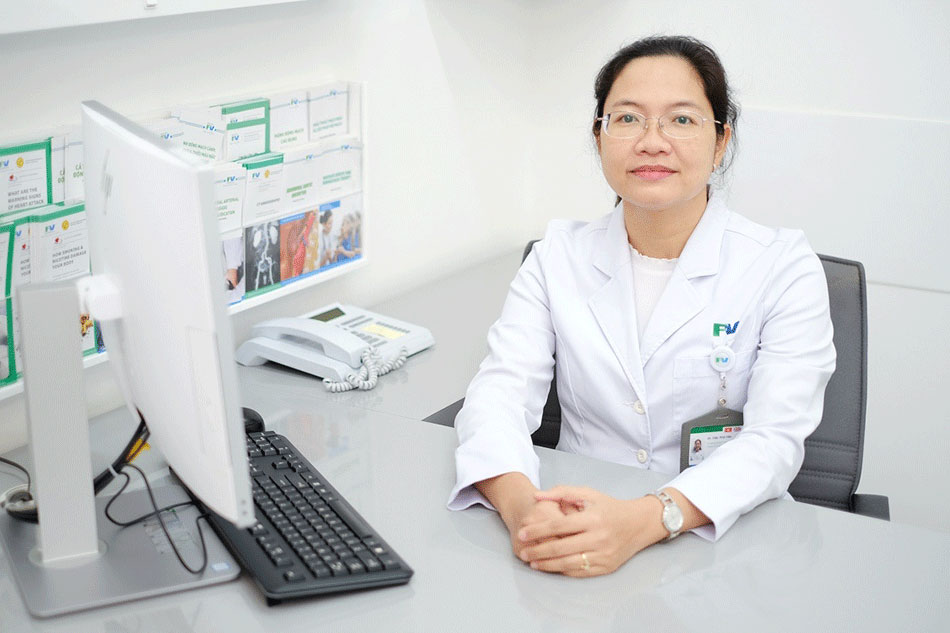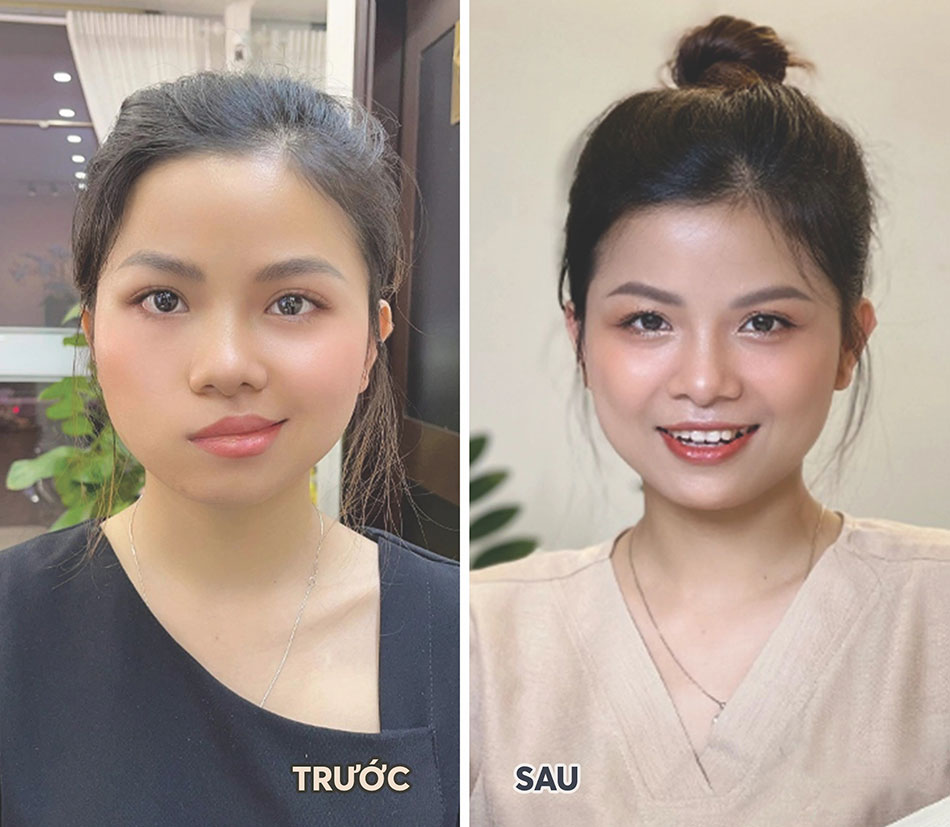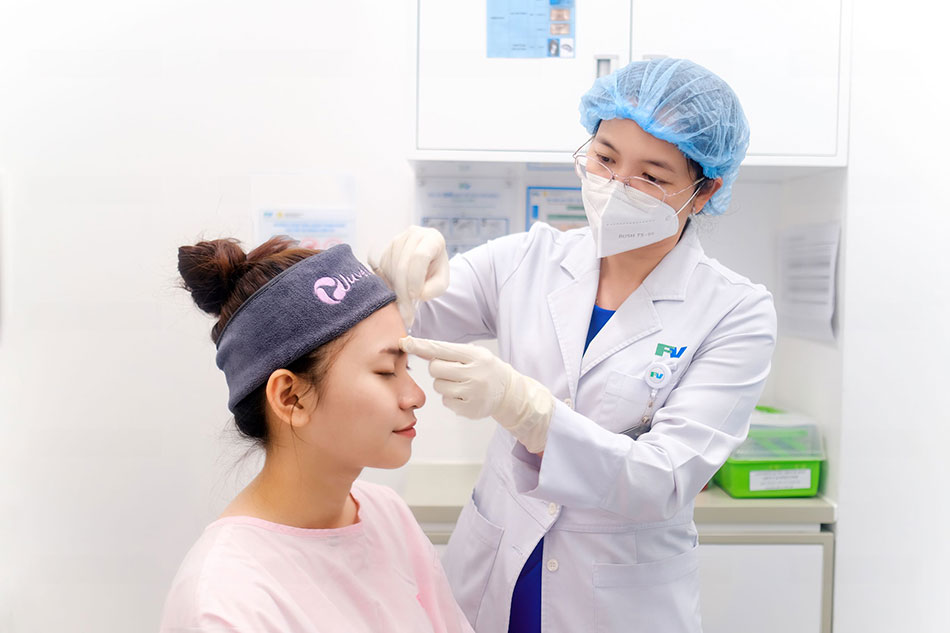Ms Tinh thought she would have to live with facial paralysis her whole life. However, she regained use of the muscles in her face after undergoing a course of traditional medicine at FV Hospital.
Facial paralysis treatment via traditional medicine
One day, when returning home from work, Ms Nguyen Thi Tinh (25 years old, living in Dong Nai) felt pain on one side of her jaw and experienced tinnitus. By noon the next day, her mouth was distorted and her face was drooping on one side. Tinh assumed these were symptoms of a cerebrovascular accident. However, when she went to the hospital, the doctors said her seventh nerve was paralysed and advised her to seek treatment through traditional medicine.
Ms Tinh visited a traditional medicine doctor and had continuous acupuncture treatment for two weeks, but her facial muscles became increasingly numb, leading to difficulties eating and drinking. Her eyes were red and constantly teary, partly because she couldn’t close her eyes properly, even when sleeping. This situation made her feel panicky and depressed.
After an introduction through friends, Tinh visited Dr Diec Kha Han, Head of the Traditional Medicine Department, FV Hospital. At that time, the muscles controlling her eyes, nose and mouth were completely paralyzed on one side.

Dr Diec Kha Han
At FV, Ms Tinh received acupressure massage and acupuncture twice a week, combined with medication. After more than two months of persistent treatment, Tinh has recovered nearly 90 per cent of her muscle activity and was instructed to continue practicing massage and facial muscles exercises at home. To date, Tinh has recovered almost all of her muscle use and she no longer needs supportive medication.

Ms Tinh’s condition before and after treatment.
“Dr Han closely monitors the recovery process of each facial muscle area and changed the acupuncture positions and treatment protocol accordingly. She is also very gentle and encouraging, which helped me to feel more secure and confident. My condition has drastically improved, and my whole family is very happy. I really didn’t expect to be able to recover like this after three months living with facial paralysis,” Tinh shares.
Causes of facial paralysis and treatment methods
Facial paralysis, also known as Bell’s palsy, is divided into two types: central facial palsy and peripheral facial nerve palsy. Central facial palsy is the paralysis of the lower half of one side of the face, such as in the mouth and cheek areas. It may include hemiplegia and is common in people with cerebrovascular accident (stroke). Peripheral facial palsy is the paralysis of half of the face, including the muscles of the forehead, eyes, cheek, and mouth. The main causes of this palsy are infections of the ear, nose and throat, teeth, jaw and mouth, facial injuries and head injuries.
Dr Han said that most cases of peripheral facial palsy are caused by attack by viruses which cause the seventh nerve to become swollen and inflamed, compressing nerve fibres and causing blockages in blood supply, leading to the paralysis in the areas affected by those nerves.
The effectiveness of treatment for facial paralysis depends completely on how quickly the patient visits a doctor after experiencing symptoms. If treated within 72 hours, the patient can make a full recovery. After this period, a patient’s ability to recover becomes more limited. In some cases, the sequelae may be prolonged and become a lifelong disability.
Dr Han says that many people assume that traditional medicine is simple and safe to administer, so they choose to visit low-cost healthcare centres that do not maintain adequate medical conditions for care, and receive insufficient treatment. Tinh’s experience of receiving poor care is relatively common.
Therefore, when detecting symptoms of facial paralysis, patients should visit the hospital as soon as possible so that the doctor can distinguish whether they are experiencing central or peripheral facial palsy. In cases of Bell’s palsy, the patient will be treated with high-dose antiviral and anti-inflammatory drugs for 10 days. This treatment can be combined with traditional medicine and physical therapy to restore nerve cell and facial muscles.
Popular traditional medicine methods include massage, acupressure, acupuncture and thread implantation to affect certain positions in the face to help the body produce endogenous substances and neurotransmitters. These internal substances have a vasodilating effect, increase blood flow to nerve cells and help the patient to recover more quickly. Simultaneously, through acupressure massage, the body is relaxed, avoiding muscle numbness following periods of facial paralysis and supporting the recovery process.
Recommendations from a traditional medicine specialist
Dr Diec Kha Han recommends that patients with facial paralysis stay calm and visit a multi-specialty hospital within the golden time to receive timely diagnosis and treatment and increase the likelihood of full recovery, avoiding prolonged sequelae.

Dr Han prepares to implant threads for a patient
FV Hospital’s Traditional Medicine Department has a combination of well-trained, experienced medical staff and modern facilities to help diagnose and provide treatment effectively, patients time and money. All specialised methods are performed in a safe, infection-free hospital room that meets JCI’s International Standards—one of the world’s highest benchmarks for medical quality.
An important note for patients with facial paralysis is that, even with a full course of treatment, the condition can recur because the virus continues to be present in nerve fibres and can cause the palsy again if their immune system declines. The area of facial paralysis can be on the same or opposite side as the previous instance.
In order to prevent the disease and avoid the risk of recurrence, patients need to avoid colds, bolster their immune system through nutrition and exercise, as well as treat any infectious diseases of the ear, nose, throat and teeth in the early stages.
Contact FV Hospital’s hotline at (028) 54 11 33 33 for consultation when experiencing symptoms of facial paralysis.



